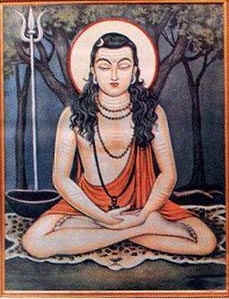The Princess and the Sanyasin(Each is great in his own place)
Many wise men sought to solve the problem. Some asserted that the Sannyasin was the greater, upon which the king demanded that they should prove their assertion. When they could not, he ordered them to marry and become householders. Then others came and said, "The householder who performs his duties is the greater man." Of them, too the king demanded proofs. When they could not give them, he made them also settle down as householders. At last there came a young Sannyasin, and the king similarly inquired of him also. He answered, "Each, O king, is equally great in his place." "Prove this to me," asked the king. "I will prove it to you," said the Sannyasin, "but you must first come and live as I do for a few days, that I may be able to prove to you what I say." The king consented and followed the Sannyasin out of his own territory and passed through many other countries until they came to a great kingdom. In the capital of that kingdom a great ceremony was going on. The king and the Sannyasin heard the noise of drums and music, and heard also the criers; the people were assembled in the streets in gala dress, and a great proclamation was being made. The king and the Sannyasin stood there to see what was going on. The crier was proclaiming loudly that the princess, daughter of the king of that country, was about to choose a husband from among those assembled before her. It was an old custom in India for princesses to choose husbands in this way. Each princess had certain ideas of the sort of man she wanted for a husband. Some would have the handsomest man, others would have only the most learned, others again the richest, and so on. All the princes of the neighbourhood put on their bravest attire and presented themselves before her. Sometimes they too had their own criers to enumerate their advantages and the reasons why they hoped the princess would choose them. The princess was taken round on a throne, in the most splendid array, and looked at and heard about them. If she was not pleased with what she saw and heard, she said to her bearers, "Move on," and no more notice was taken of the rejected suitors. If, however, the princess was pleased with any one of them, she threw a garland of flowers over him and he became her husband.
The king of that country thought that perhaps this man was poor and so dared not marry the princess, and said to him, "With my daughter goes half my kingdom now, and the whole kingdom after my death!" and put the garland again on the Sannyasin. The young man threw it off once more, saying, "Nonsense! I do not want to marry," and walked quickly away from the assembly. Now the princess had fallen so much in love with this young man that she said, "I must marry this man or I shall die"; and she went after him to bring him back. Then our other Sannyasin, who had brought the king there, said to him, "King, let us follow this pair"; so they walked after them, but at a good distance behind. The young Sannyasin who had refused to marry the princess walked out into the country for several miles. When he came to a forest and entered into it, the princess followed him, and the other two followed them. Now this young Sannyasin was well acquainted with that forest and knew all the intricate paths in it. He suddenly passed into one of these and disappeared, and the princess could not discover him. After trying for a long time to find him she sat down under a tree and began to weep, for she did not know the way out. Then our king and the other Sannyasin came up to her and said, "Do not weep; we will show you the way out of this forest, but it is too dark for us to find it now. Here is a big tree; let us rest under it, and in the morning we will go early and show you the road."
The guests saw him falling and tried to save him, but he was too quick for them. The little bird's wife saw what her husband did, and she said, "Here are three persons and only one little bird for them to eat. It is not enough; it is my duty as a wife not to let my husband's effort go in vain; let them have my body also." Then she fell into the fire and was burned to death.
"If you want to be a householder, hold your life a sacrifice for the welfare of others; and if you choose the life of renunciation, do not even look at beauty and money and power. "Each is great in his own place, but the duty of the one is not the duty of the other."
|
- www.vivekananda.net edited by Frank Parlato Jr.
 A certain king used to inquire of all the Sannyasins that came to his country, "Which is the greater man--he who gives up the world and becomes a Sannyasin, or he who lives in the world and performs his duties as a householder?"
A certain king used to inquire of all the Sannyasins that came to his country, "Which is the greater man--he who gives up the world and becomes a Sannyasin, or he who lives in the world and performs his duties as a householder?"